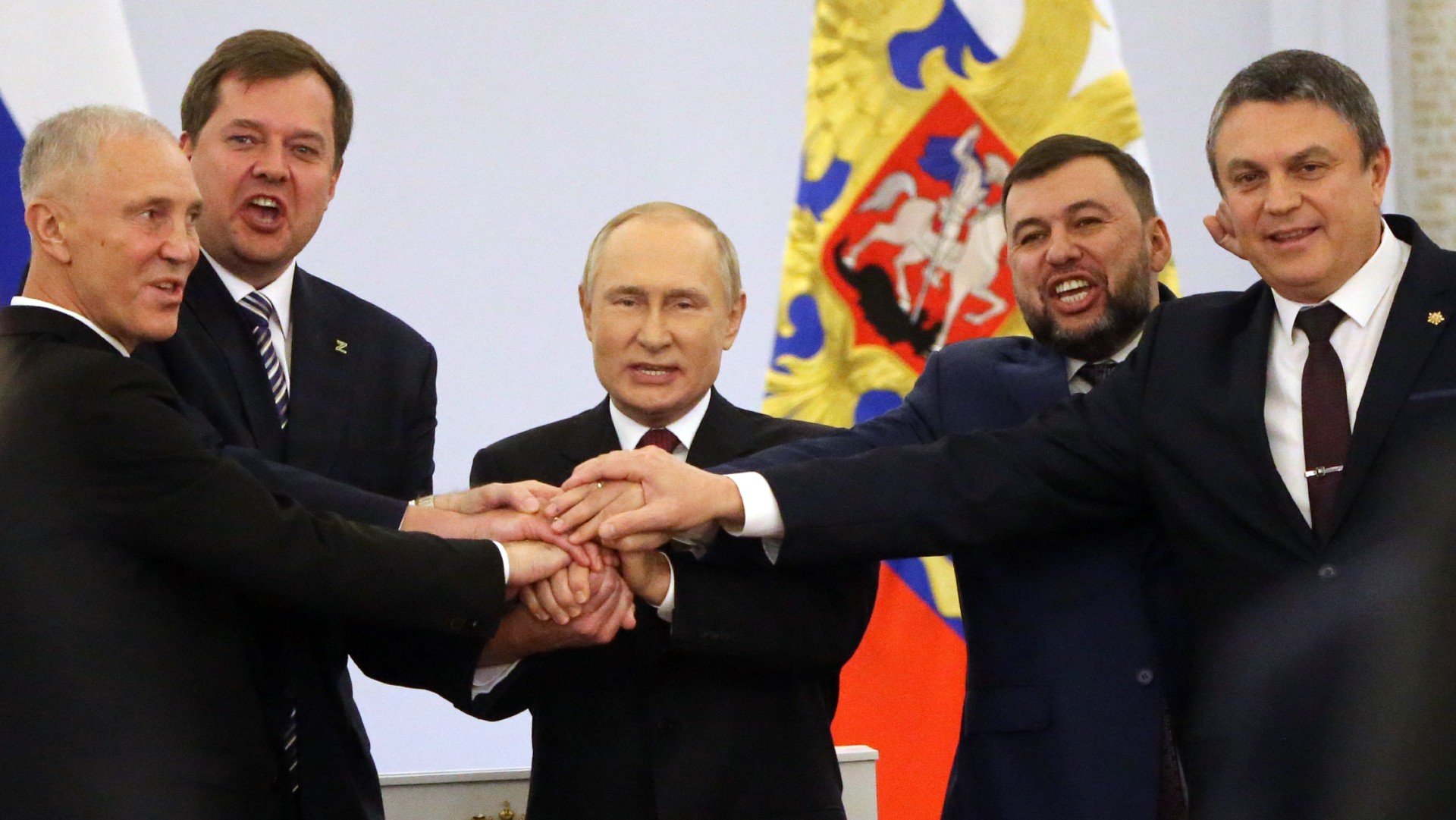Is Putin preparing for a nuclear attack on Ukraine?
Reports of nuclear weapons on the move in Russia raises fear of further escalation

A free daily email with the biggest news stories of the day – and the best features from TheWeek.com
You are now subscribed
Your newsletter sign-up was successful
The recent movement of nuclear weapons by Russia may be a further “signal to the West” that Vladimir Putin is set to intensify his war against Ukraine.
On Sunday, Italy’s la Repubblica reported that Western intelligence figures believed the Belgorod, the world’s longest submarine, was in waters near the Arctic for “a series of secret tests”. The sub has been modified to carry the new nuclear-powered, nuclear-armed drone called the Poseidon.
Separate reports on the pro-Russian Telegram channel Rybar claimed that a convoy of military equipment believed to belong to a secretive nuclear unit was heading to the frontline.
The Week
Escape your echo chamber. Get the facts behind the news, plus analysis from multiple perspectives.

Sign up for The Week's Free Newsletters
From our morning news briefing to a weekly Good News Newsletter, get the best of The Week delivered directly to your inbox.
From our morning news briefing to a weekly Good News Newsletter, get the best of The Week delivered directly to your inbox.
Konrad Muzyka, a Poland-based defence analyst specialising in Ukraine, said that the unit “is responsible for nuclear munitions, their storage, maintenance, transport, and issuance” and the convoy’s movement to the Ukraine border could be a “signalling to the West that Moscow is escalating”.
Following the so-called “partial mobilisation” of Russian troops, last week marked a further escalation in the seven-month conflict when Putin issued what The Moscow Times called “thinly veiled threats” to use nuclear weapons. The president announced he would use “all means at our disposal” to defend Russia after unilaterally proclaiming four eastern Ukrainian provinces part of Russia, adding “this is not a bluff”.
What did the papers say?
Russia’s illegal annexation of four Ukrainian regions following a series of hastily arranged sham referendums orchestrated by the Kremlin, was seen by many as a point of no return for Putin.
His land grab “has threatened to push the conflict to a dangerous new level, raising the prospect of a nuclear strike masquerading as a defence of Russian territory”, said The Times.
A free daily email with the biggest news stories of the day – and the best features from TheWeek.com
“With Russian forces retreating in Ukraine’s Donbas region, Mr. Putin’s threats amount to desperate saber-rattling intended to frighten all,” said The Washington Post. “But his threats must not be brushed off completely, given Mr. Putin’s record of folly and recklessness.”
It is worth clarifying, said the paper, that we are not talking about nuclear warheads carried by “continent-spanning intercontinental ballistic missiles, capable of city-busting strikes with limited warning, which defined the Cold War”, but rather “nonstrategic or tactical nuclear weapons, designed to be launched from ground-based missiles, airplanes or naval vessels”.
The Kremlin has played down calls from Chechen leader and Putin loyalist Ramzan Kadyrov – who has sent three of his own sons to join the fighting – for Russia to use “low-yield nuclear weapons” in Ukraine. Putin’s spokesman Dmitry Peskov said that there were “no other considerations” apart from using nuclear weapons according to Russia’s military doctrine, which permits their deployment if Russia is struck first or if the very existence of the state is at risk.
Nevertheless, James Rogers, director of research at the Council on Geostrategy, told The Times that “given the quality of the decision-making in the Kremlin at the moment, nothing should be discounted. The Russians are getting desperate, but it would be a dramatic escalation and one that countries such as India and even China would surely condemn.”
What next?
“Western officials and military experts believe the risk that Putin will deploy nuclear weapons is low,” the Financial Times reported. “But as Russian forces suffer military setbacks in south-eastern Ukraine, they also recognise that risk is rising.”
Much will depend on how the conventional ground war progresses, with Ukrainian forces continuing to make gains in territory now classed as Russian by the Kremlin.
Were Putin to deploy tactical nuclear weapons in Ukraine the pressure would then be on Nato, led by the US, to respond.
US President Joe Biden has already warned of severe consequences in such an event and on Sunday the former CIA director and retired general David Petraeus went further. He said Nato should launch a massive conventional non-nuclear military response, including sinking Russia’s Black Sea fleet, if the Kremlin used a tactical nuclear weapon in Ukraine.
“But western officials have by and large remained vague in their threats of retaliation even if Putin targets Ukraine, a non-Nato member, as deterrence rests on ambiguity,” said the FT.
Were Nato to react with direct military action this would “be a recipe for wider war with Russia”, said The Washington Post. “Far better to stop Mr. Putin before the cataclysm.”
Elliott Goat is a freelance writer at The Week Digital. A winner of The Independent's Wyn Harness Award, he has been a journalist for over a decade with a focus on human rights, disinformation and elections. He is co-founder and director of Brussels-based investigative NGO Unhack Democracy, which works to support electoral integrity across Europe. A Winston Churchill Memorial Trust Fellow focusing on unions and the Future of Work, Elliott is a founding member of the RSA's Good Work Guild and a contributor to the International State Crime Initiative, an interdisciplinary forum for research, reportage and training on state violence and corruption.